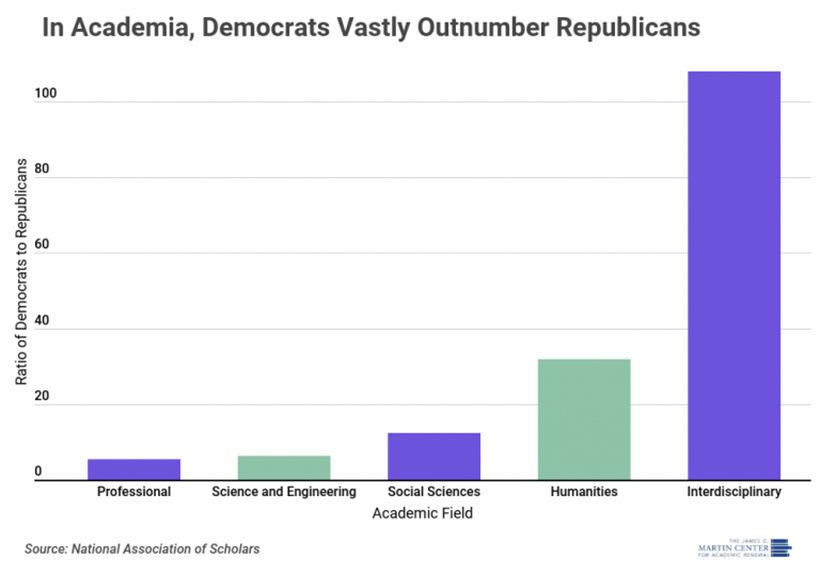Committed to the First Amendment and OUR Freedom of Speech since 2008
Did You Know? Democrats Dominate Professorships
Published: Thursday, August 22nd, 2019 @ 4:50 pm
By: James G. Martin Center for Academic Renewal † ( More Entries )
By: James G. Martin Center for Academic Renewal † ( More Entries )
Publisher's note: The James G. Martin Center for Academic Renewal is a nonprofit institute dedicated to improving higher education in North Carolina and the nation. Located in Raleigh, North Carolina, it has been an independent 501(c)(3) organization since 2003. It was known as the John W. Pope Center for Higher Education Policy until early January 2017.
The author of this post is Thomas Connor.

The dominance of registered Democrats to Republicans in academia is becoming more and more apparent. In the sample provided by Mitchell Langbert of the National Association of Scholars, 39 percent of academic departments have no Republican faculty member. He also found that the mean ratio of Democrats to Republicans is 10.4 to 1 after examining the political affiliation of professors from the top 50 liberal arts colleges in the country.
The problem with political homogeneity is that it can bias research and reduce academic credibility. In The Politics of Social Psychology, edited by Jarret Crawford and Lee Jussim, the writers argue that many researchers and scientists' implicit biases affect them. Political homogeneity can limit the questions and topics professors focus on. When departments such as gender studies or Africana studies have zero Republican professors, for instance, it raises the question of whether the research they publish is reputable.
In aggregate, science, technology, engineering, and math (STEM) fields have the closest ratio, 5.5 Democrats to every Republican. The interdisciplinary subjects, such as gender studies or Africana studies, had no Republicans at all. Of the 108 professors surveyed in this field by Langbert, none were Republicans. Comparing those numbers to the national ratio of 1.6 Democrats to Republicans with graduate school experience, this gap is a significant difference.
Some of that difference, though, can be explained by Republicans being more attracted to business rather than academia. Republicans comprise roughly 50 percent of corporate board members compared to Democrats' 26 percent. However, the political imbalance of academia can hurt research because the lack of viewpoint diversity means professors' thinking may go unchallenged.
To read more Martin Center articles on this topic, go to https://www.jamesgmartin.center/tag/intellectual-diversity/
Thomas Connor is a Martin Center intern. He is a junior at the University of Notre Dame studying economics and political science.
Go Back
The author of this post is Thomas Connor.

The dominance of registered Democrats to Republicans in academia is becoming more and more apparent. In the sample provided by Mitchell Langbert of the National Association of Scholars, 39 percent of academic departments have no Republican faculty member. He also found that the mean ratio of Democrats to Republicans is 10.4 to 1 after examining the political affiliation of professors from the top 50 liberal arts colleges in the country.
The problem with political homogeneity is that it can bias research and reduce academic credibility. In The Politics of Social Psychology, edited by Jarret Crawford and Lee Jussim, the writers argue that many researchers and scientists' implicit biases affect them. Political homogeneity can limit the questions and topics professors focus on. When departments such as gender studies or Africana studies have zero Republican professors, for instance, it raises the question of whether the research they publish is reputable.
In aggregate, science, technology, engineering, and math (STEM) fields have the closest ratio, 5.5 Democrats to every Republican. The interdisciplinary subjects, such as gender studies or Africana studies, had no Republicans at all. Of the 108 professors surveyed in this field by Langbert, none were Republicans. Comparing those numbers to the national ratio of 1.6 Democrats to Republicans with graduate school experience, this gap is a significant difference.
Some of that difference, though, can be explained by Republicans being more attracted to business rather than academia. Republicans comprise roughly 50 percent of corporate board members compared to Democrats' 26 percent. However, the political imbalance of academia can hurt research because the lack of viewpoint diversity means professors' thinking may go unchallenged.
To read more Martin Center articles on this topic, go to https://www.jamesgmartin.center/tag/intellectual-diversity/
Thomas Connor is a Martin Center intern. He is a junior at the University of Notre Dame studying economics and political science.
Latest Op-Ed & Politics
|
Biden wants to push this in public schools and Gov. deSantis says NO
Published: Thursday, April 25th, 2024 @ 9:19 pm
By: John Steed
|
|
eve 45% of Latinos support mass deportation
Published: Thursday, April 25th, 2024 @ 12:40 pm
By: John Steed
|
|
this at the time that pro-Hamas radicals are rioting around the country
Published: Thursday, April 25th, 2024 @ 8:01 am
By: John Steed
|
|
Pro death roundtable
Published: Wednesday, April 24th, 2024 @ 12:39 pm
By: Countrygirl1411
|
|
populist / nationalist anti-immigration AfD most popular party among young voters, CDU second
Published: Wednesday, April 24th, 2024 @ 11:25 am
By: John Steed
|
|
political scheme behhind raid on Mar-a-Lago
Published: Wednesday, April 24th, 2024 @ 9:16 am
By: John Steed
|
|
how many of these will come to North Carolina?
Published: Tuesday, April 23rd, 2024 @ 1:32 pm
By: John Steed
|
|
Barr had previously said he would jump off a bridge before supporting Trump
Published: Tuesday, April 23rd, 2024 @ 11:37 am
By: John Steed
|
|
Babis is leader of opposition in Czech parliament
Published: Tuesday, April 23rd, 2024 @ 10:28 am
By: John Steed
|
|
illegal alien "asylum seeker" migrants are a crime wave on both sides of the Atlantic
Published: Tuesday, April 23rd, 2024 @ 9:44 am
By: John Steed
|
|
only one holdout against acquital
Published: Tuesday, April 23rd, 2024 @ 9:01 am
By: John Steed
|
|
DEI now includes criminals?
Published: Monday, April 22nd, 2024 @ 8:33 pm
By: John Steed
|
|
Biden regime intends to force public school compliance as well as colleges
Published: Monday, April 22nd, 2024 @ 1:55 pm
By: John Steed
|
|
clamps down on oil drilling in Alaska
Published: Monday, April 22nd, 2024 @ 9:09 am
By: John Steed
|
|
plan put in place by Eric Holder
Published: Monday, April 22nd, 2024 @ 7:38 am
By: John Steed
|
|
prosecutors appeal acquittal of member of parliament in lower court for posting Bible verse
Published: Sunday, April 21st, 2024 @ 9:14 am
By: John Steed
|























